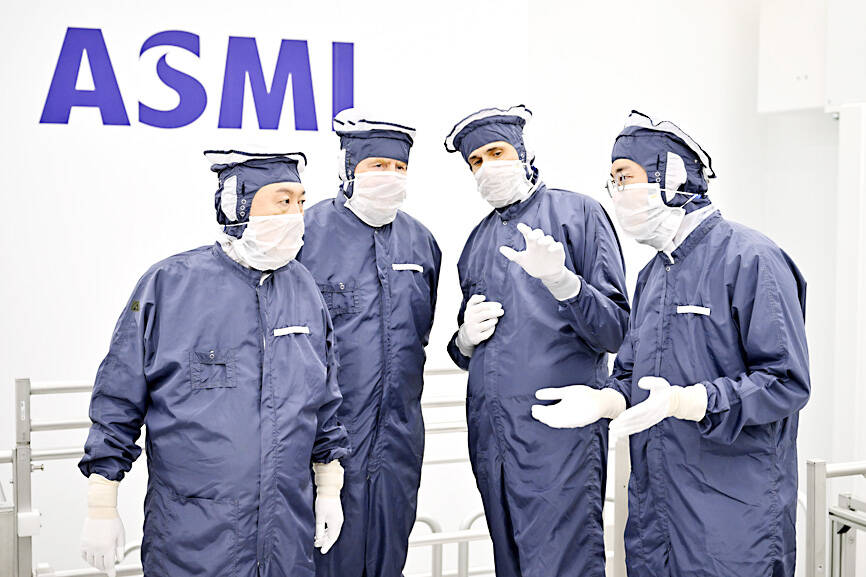ASML Holding NV and Samsung Electronics Co are to jointly spend 1 trillion won (US$760 million) to build a South Korean plant to develop cutting-edge semiconductor processing technology.
The plant is to use next-generation extreme ultraviolet equipment technology, available exclusively via ASML, that is used to produce high-end chips, the Veldhoven, Netherlands-based company said in a statement on Tuesday.
The new plant expands ASML’s presence in South Korea, where it already has four sites serving customers including Samsung. Geographic diversity is increasingly important with ASML and its unique technology at the center of a trade dispute between the US and China.

Photo: EPA-EFE
South Korean President Yoon Suk-yeol visited ASML’s headquarters with Dutch King Willem-Alexander on Tuesday to see the production of next-generation extreme ultraviolet lithography machines, a statement from the South Korean presidential office said.
Samsung executive chairman Jay Y. Lee and SK Group chairman Chey Tae-won also joined the tour, the statement said.
Yoon has sought to strengthen technology ties with the US and other nations more aligned with Washington since taking office last year. He has also called for more efforts for South Korea to build technology clusters on its own soil to refine and produce cutting-edge products from semiconductors to electric vehicles, as a buffer against rising global competition for tech dominance.
The two nations also announced plans to establish a “Korea-Netherlands Advanced Semiconductor Academy,” which would allow students and workers in South Korea to have education opportunities in the Netherlands.
ASML, which is facing a severe labor shortage, depends on foreign talent to expand its business.
ASML is the world’s top maker of lithography systems, machines that perform a crucial step in the process of creating semiconductors.
It is the world’s only source of extreme ultraviolet lithography machines used by Taiwan Semiconductor Manufacturing Co (台積電), Samsung and Intel Corp for the most advanced fabrication.

BYPASSING CHINA TARIFFS: In the first five months of this year, Foxconn sent US$4.4bn of iPhones to the US from India, compared with US$3.7bn in the whole of last year Nearly all the iPhones exported by Foxconn Technology Group (富士康科技集團) from India went to the US between March and last month, customs data showed, far above last year’s average of 50 percent and a clear sign of Apple Inc’s efforts to bypass high US tariffs imposed on China. The numbers, being reported by Reuters for the first time, show that Apple has realigned its India exports to almost exclusively serve the US market, when previously the devices were more widely distributed to nations including the Netherlands and the Czech Republic. During March to last month, Foxconn, known as Hon Hai Precision Industry

Taiwan Semiconductor Manufacturing Co (TSMC, 台積電) and the University of Tokyo (UTokyo) yesterday announced the launch of the TSMC-UTokyo Lab to promote advanced semiconductor research, education and talent development. The lab is TSMC’s first laboratory collaboration with a university outside Taiwan, the company said in a statement. The lab would leverage “the extensive knowledge, experience, and creativity” of both institutions, the company said. It is located in the Asano Section of UTokyo’s Hongo, Tokyo, campus and would be managed by UTokyo faculty, guided by directors from UTokyo and TSMC, the company said. TSMC began working with UTokyo in 2019, resulting in 21 research projects,

Ashton Hall’s morning routine involves dunking his head in iced Saratoga Spring Water. For the company that sells the bottled water — Hall’s brand of choice for drinking, brushing his teeth and submerging himself — that is fantastic news. “We’re so thankful to this incredible fitness influencer called Ashton Hall,” Saratoga owner Primo Brands Corp’s CEO Robbert Rietbroek said on an earnings call after Hall’s morning routine video went viral. “He really helped put our brand on the map.” Primo Brands, which was not affiliated with Hall when he made his video, is among the increasing number of companies benefiting from influencer

Quanta Computer Inc (廣達) chairman Barry Lam (林百里) yesterday expressed a downbeat view about the prospects of humanoid robots, given high manufacturing costs and a lack of target customers. Despite rising demand and high expectations for humanoid robots, high research-and-development costs and uncertain profitability remain major concerns, Lam told reporters following the company’s annual shareholders’ meeting in Taoyuan. “Since it seems a bit unworthy to use such high-cost robots to do household chores, I believe robots designed for specific purposes would be more valuable and present a better business opportunity,” Lam said Instead of investing in humanoid robots, Quanta has opted to invest